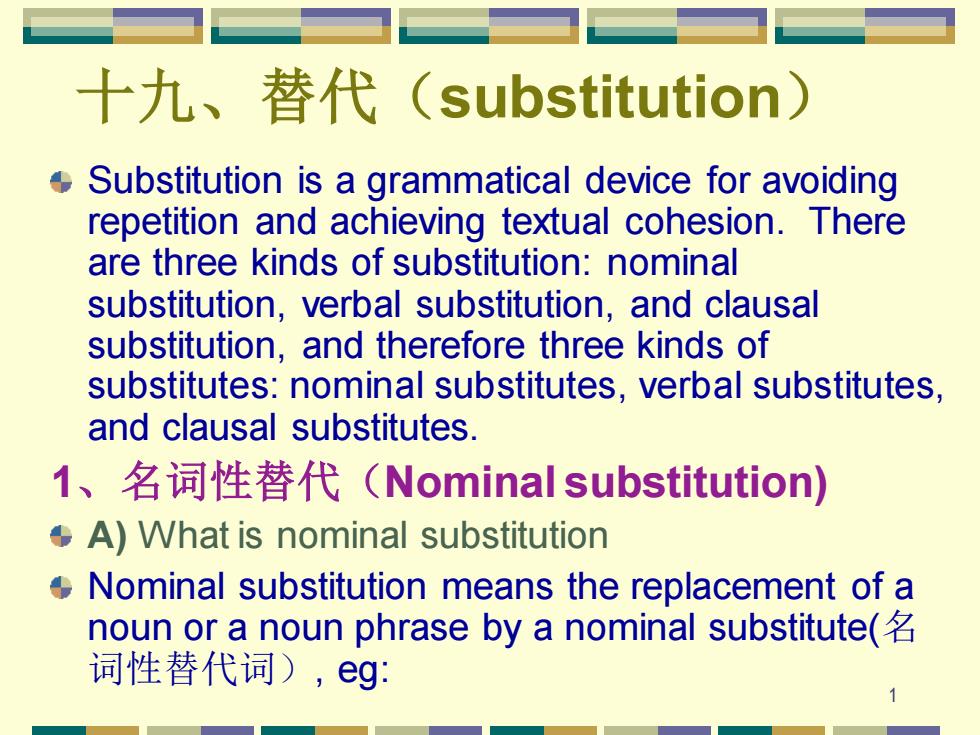
十九、替代 (substitution) Substitution is a grammatical device for avoiding repetition and achieving textual cohesion.There are three kinds of substitution:nominal substitution,verbal substitution,and clausal substitution,and therefore three kinds of substitutes:nominal substitutes,verbal substitutes, and clausal substitutes. 1、名词性替代(Nominal substitution) A)What is nominal substitution Nominal substitution means the replacement of a noun or a noun phrase by a nominal substitute( 词性替代词),eg: 1
1 十九、替代(substitution) Substitution is a grammatical device for avoiding repetition and achieving textual cohesion. There are three kinds of substitution: nominal substitution, verbal substitution, and clausal substitution, and therefore three kinds of substitutes: nominal substitutes, verbal substitutes, and clausal substitutes. 1、名词性替代(Nominal substitution) A) What is nominal substitution Nominal substitution means the replacement of a noun or a noun phrase by a nominal substitute(名 词性替代词), eg:
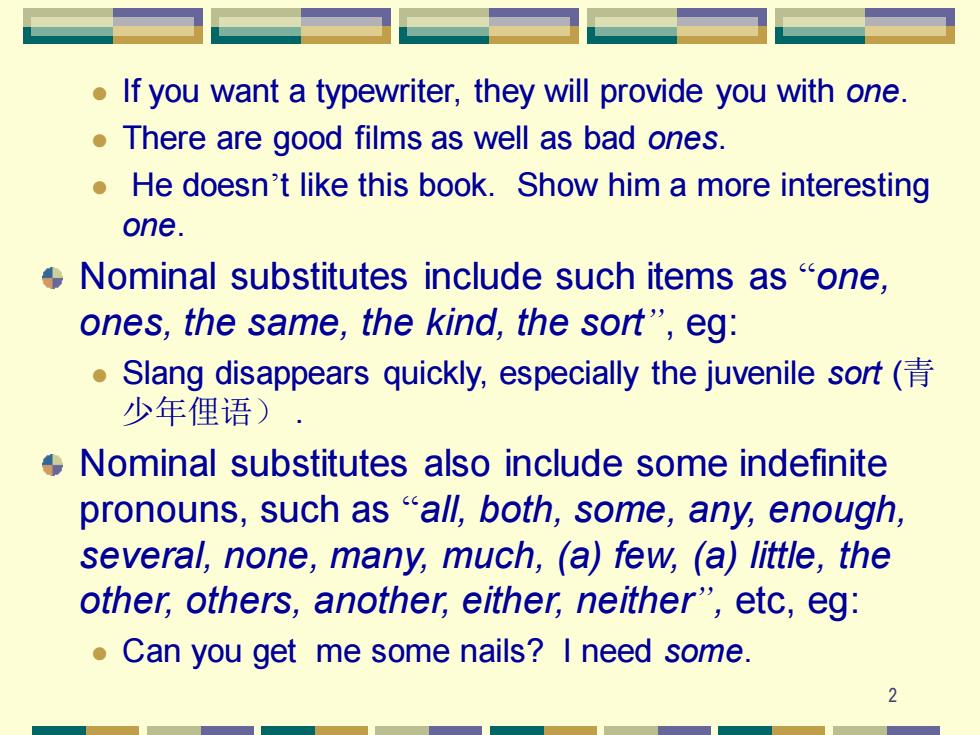
If you want a typewriter,they will provide you with one. There are good films as well as bad ones. He doesn't like this book.Show him a more interesting one. Nominal substitutes include such items as"one, ones,the same,the kind,the sort",eg: Slang disappears quickly,especially the juvenile sort 少年俚语)· Nominal substitutes also include some indefinite pronouns,such as "all,both,some,any,enough several,none,many,much,(a)few,(a)little,the other,others,another,either,neither",etc,eg: Can you get me some nails?I need some
2 ⚫ If you want a typewriter, they will provide you with one. ⚫ There are good films as well as bad ones. ⚫ He doesn’t like this book. Show him a more interesting one. Nominal substitutes include such items as “one, ones, the same, the kind, the sort”, eg: ⚫ Slang disappears quickly, especially the juvenile sort (青 少年俚语) . Nominal substitutes also include some indefinite pronouns, such as “all, both, some, any, enough, several, none, many, much, (a) few, (a) little, the other, others, another, either, neither” , etc, eg: ⚫ Can you get me some nails? I need some
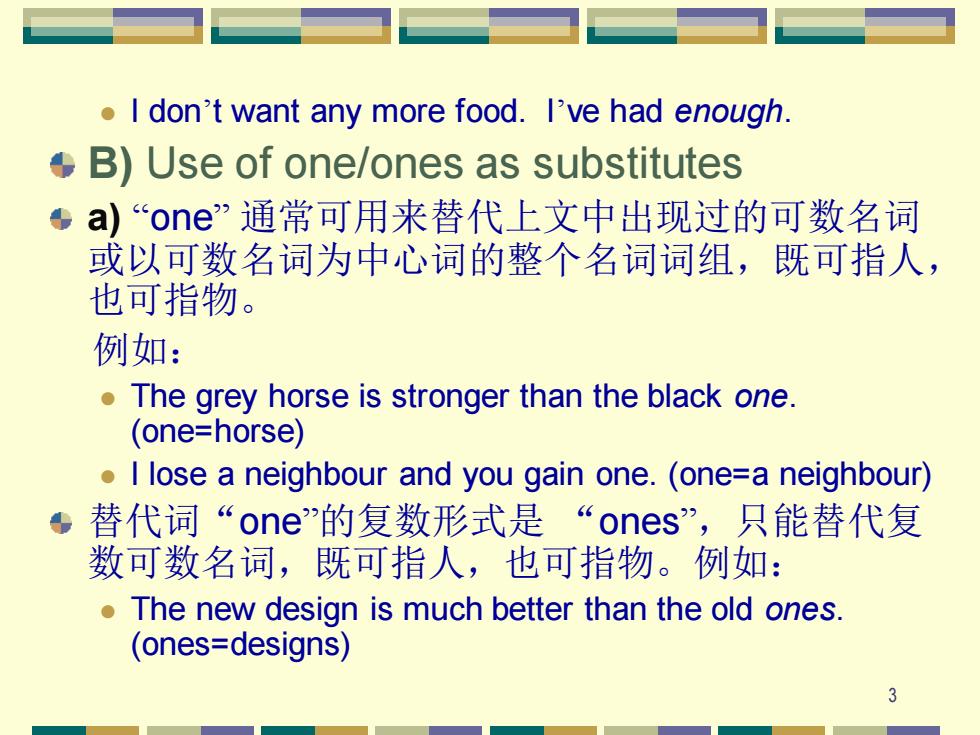
I don't want any more food.I've had enough. B)Use of one/ones as substitutes a)one”通常可用来替代上文中出现过的可数名词 或以可数名词为中心词的整个名词词组,既可指人, 也可指物。 例如: The grey horse is stronger than the black one. (one=horse) .I lose a neighbour and you gain one.(one=a neighbour) 替代词“one的复数形式是“ones”,只能替代复 数可数名词,既可指人,也可指物。例如: The new design is much better than the old ones. (ones=designs) 3
3 ⚫ I don’t want any more food. I’ve had enough. B) Use of one/ones as substitutes a) “one” 通常可用来替代上文中出现过的可数名词 或以可数名词为中心词的整个名词词组,既可指人, 也可指物。 例如: ⚫ The grey horse is stronger than the black one. (one=horse) ⚫ I lose a neighbour and you gain one. (one=a neighbour) 替代词“one”的复数形式是 “ones” ,只能替代复 数可数名词,既可指人,也可指物。例如: ⚫ The new design is much better than the old ones. (ones=designs)
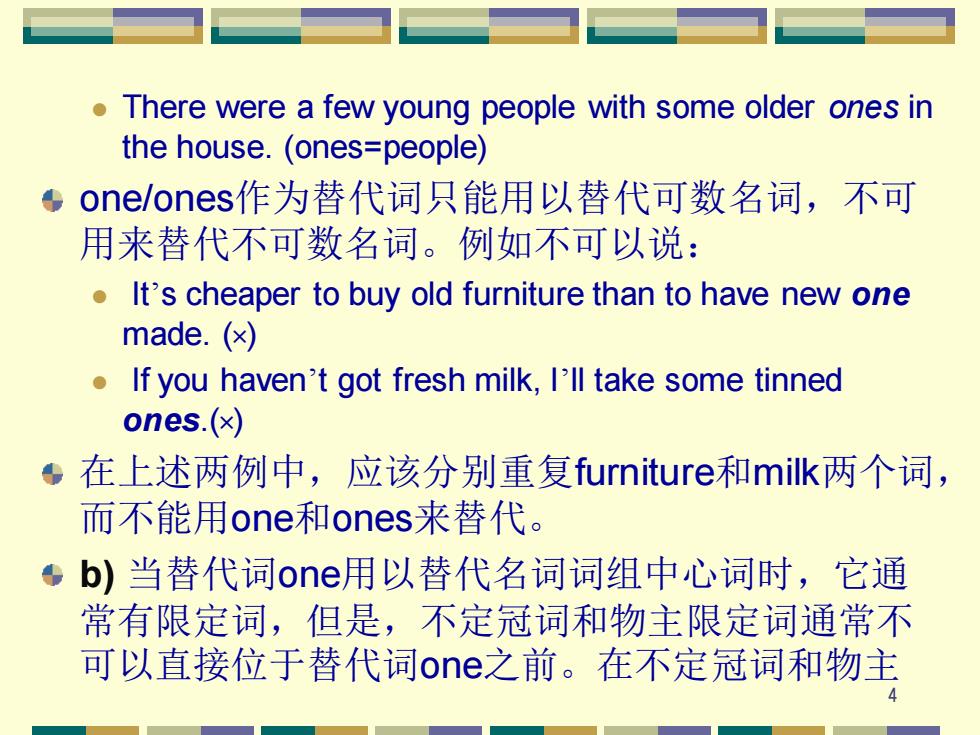
There were a few young people with some older ones in the house.(ones=people) 5 one/ones作为替代词只能用以替代可数名词,不可 用来替代不可数名词。例如不可以说: It's cheaper to buy old furniture than to have new one made.(x) If you haven't got fresh milk,I'll take some tinned ones.(x) s在上述两例中,应该分别重复furniture和milk两个词, 而不能用one和ones来替代。 b)当替代词one用以替代名词词组中心词时,它通 常有限定词,但是,不定冠词和物主限定词通常不 可以直接位于替代词one之前。在不定冠词和物主
4 ⚫ There were a few young people with some older ones in the house. (ones=people) one/ones作为替代词只能用以替代可数名词,不可 用来替代不可数名词。例如不可以说: ⚫ It’s cheaper to buy old furniture than to have new one made. (╳) ⚫ If you haven’t got fresh milk, I’ll take some tinned ones.(╳) 在上述两例中,应该分别重复furniture和milk两个词, 而不能用one和ones来替代。 b) 当替代词one用以替代名词词组中心词时,它通 常有限定词,但是,不定冠词和物主限定词通常不 可以直接位于替代词one之前。在不定冠词和物主
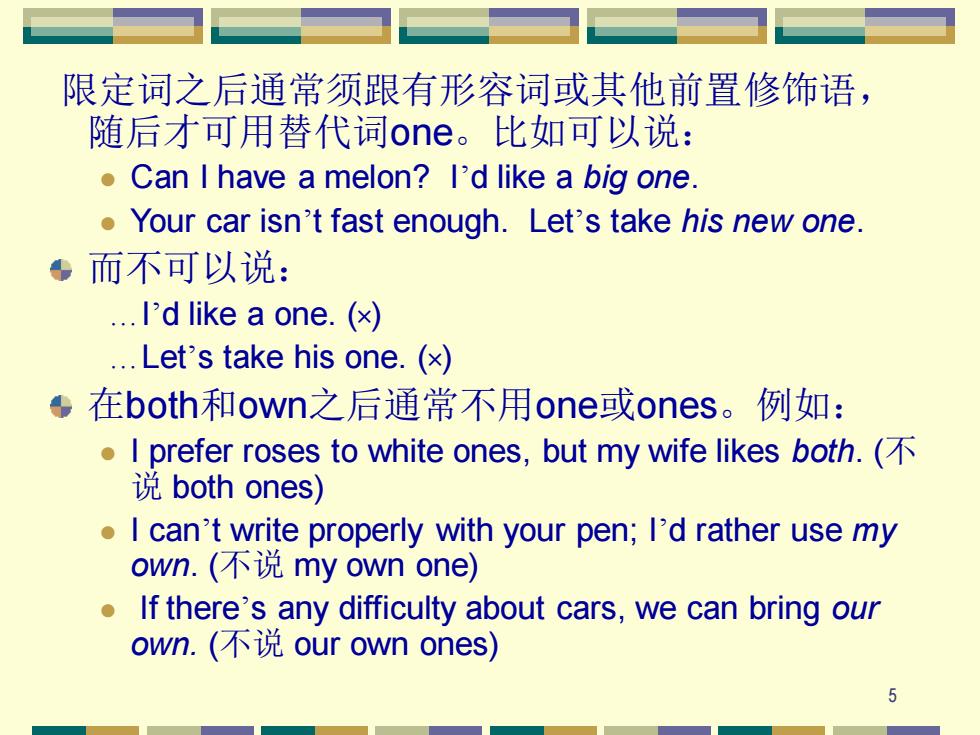
限定词之后通常须跟有形容词或其他前置修饰语, 随后才可用替代词one。比如可以说: Can I have a melon?I'd like a big one. Your car isn't fast enough.Let's take his new one $而不可以说: ...I'd like a one.(x) ..Let's take his one.(x) 号在both和own之后通常不用one或ones。例如: I prefer roses to white ones,but my wife likes both. 说both ones) I can't write properly with your pen;I'd rather use my own.(不说ny own one) If there's any difficulty about cars,we can bring our own.(不说our own ones) 5
5 限定词之后通常须跟有形容词或其他前置修饰语, 随后才可用替代词one。比如可以说: ⚫ Can I have a melon? I’d like a big one. ⚫ Your car isn’t fast enough. Let’s take his new one. 而不可以说: …I’d like a one. (╳) …Let’s take his one. (╳) 在both和own之后通常不用one或ones。例如: ⚫ I prefer roses to white ones, but my wife likes both. (不 说 both ones) ⚫ I can’t write properly with your pen; I’d rather use my own. (不说 my own one) ⚫ If there’s any difficulty about cars, we can bring our own. (不说 our own ones)